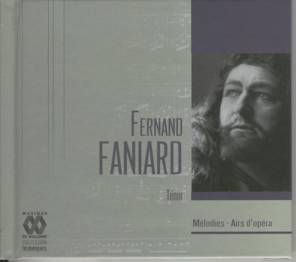CD Musique en Walonnie MEW 805

Fernand Faniard: Mélodies – Airs d’opéra
CD Musique en Walonnie MEW 805

To be honest, I fear this admirable issue is not going to make a lasting impression on vocal buffs due to the unrepresentative repertoire. It is a painstakingly fine transfer of radio broadcasts that have been circulating for many years on cassette and on cd-r. Fernand Smeets was born in 1894 in Sint-Joost-ten-Node, a Brussels suburb; at the time mainly speaking Dutch which was Smeets’ mother language. He had a promising baritone voice and made his début at De Munt in 1920. Six years later, after having restudied his voice, he became a heroic tenor singing at the Antwerp French Opera (that would disappear forever due to the economic crisis, leaving the field to the Dutch speaking Royal Flemish opera). He soon went to France and made his début at the Palais Garnier in 1930. He would sing there on and off untill 1951. When not in Paris he sang at the big French theatres or in the French colonies; always in French and often in roles from the German repertoire. An Italian début in Parma however was a failure. During the war he often returned to his mother country, mostly singing his German roles in Dutch in Antwerp. After the war he became a Frenchman and he died in Paris in 1955.
Faniard’s only commercial record consists of two Flemish songs and I highly regret they are not on this CD as after all they show the younger singer. I too well know there is no love lost nowadays in Belgium between Flemings and Walloons and it is somewhat politically difficult for a series called “Musique en Wallonie” to publish Dutch songs but still it is a loss for the listener. The recordings on this CD are from a few radio performances in 1949 at Radio Alger while others are private recordings one year later plus a recital of French mélodies for German radio in 1951; so at the real end of Faniard’s career though it is difficult to hear a marked vocal decline. Of course there are no real vocal hurdles in these French mélodies or German songs in the terms of tessitura or overcoming a Wagnerian orchestra but one nevertheless hears a still an impressive voice. The sound is manly and baritonal with an interesting timbre and he shows some metal in Schumann’s “Ich grolle nicht”, proving that after all he was mainly a Wagnerian tenor. Nevertheless he is well able to use a refined piano when necessary. His German pronunciation is fine, surely in a time when few singers making a career in France were able to sing in that language. He himself translated two Hugo Wolf songs into French; not very interesting ones in symphonic version and more noisy than anything else. There are only two operatic selections on the CD. Zémire is not very representative for Faniard though Alceste is and it offers fair competition to Ansseau’s more famous version. Of course the voice is less richly coloured and there are hints of throatiness at the end of a distinguished career. These version make us nevertheless regret that the tenor during his heydays never recorded Wagner in French as did Thill, Verdière etc who succeeded in making the German composer’s work often more belcanto like compared to the dreaded bark of their German language contemporaries. The operatic arias come at the end of the CD and I think it better to start your listening experience with them and then work your way forward with some mélodies and return the next day to a few other songs because in my experience, playing the CD throughout makes for a rather boring evening. As always with these series the sleeve notes by Frédéric Lemmers are exemplary (French, English and Dutch), the photographs are numerous and interesting.
Jan Neckers, operanostalgia